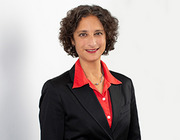Europa now needs a "security policy decade"
by Christian Mölling
Trump’s re-election has cast a shadow over Europe. The Old World is already more vulnerable than it has been for a long time. The biggest land war in 70 years is raging and the continent’s economic performance is suffering. It is precisely these two key areas – the economy and defense – that will undoubtedly be on the next president’s policy agenda and put further pressure on Europe. One can speculate whether Trump’s personal obsession or his advisors’ cool rationality will spur him to turn Europe’s weakness into an advantage for the United States. This, however, distracts from the fact that such a thing is even possible only because Europe has made it possible: Europe’s weakness is home-grown. It also distracts from the fact that the ability to emerge from this predicament still lies in Europe’s own hands.
The silver lining: Everyone now agrees that, unlike with Kamala Harris, the preferred candidate, there are unlikely to be any compromises with Trump that will allow Europe to stay in its comfort zone. Not only can Europe help itself, it must.
Feebly pointing out that many countries are meeting NATO’s 2% quota is not only self-deception, it’s self-endangerment. All of NATO’s European members are already aware that they will have to spend considerably more to arm themselves against the most proximate threat: a Russian attack on NATO territory. And this is true regardless of whether the US remains engaged in Europe. Should the US withdraw its security guarantee, Europe would have to do even more to close the gap in its security. Yes, this cannot be accomplished overnight; and yes, it entails a high risk of Europe having to answer for its own security. But finally starting to do so makes more sense than hoping every four years that voters in the US will elect someone who is willing to consider Europe and not just America. This time, at least, the US electorate decided differently and chose not to prioritize Europe over America’s own problems.
In the economic sphere, Draghi has done the math: Becoming competitive again will also be expensive. The same applies to both areas, the economy and defense: The financial outlay can be seen as investing in future negotiations with the US. After all, there is something to be gained here, too: clout vis-à-vis Washington. If Europe does not want to accept the offers made by the US or give in to its threats, it will need the financial resilience to enter into a conflict and see it through.
The hopelessness could thus create the opportunity to transform Europe so that it is more successful in the future. Not only in relation to the US, but other global competitors as well, and when defending itself against threats and blackmail, both economic and military.
That is why, for its own sake, Europe should declare a "security policy decade": a 10-year plan the member states and European Commission can use to reduce fundamental weaknesses in security or even transform them into strengths. This will require money – lots of money. But not only. The most difficult question will be how Europe can credibly demonstrate that it would deploy its newfound military and economic strength as a united Europe.
Russia forges closer alliances in the shadow of the US election
by Daniela Schwarzer
Donald Trump’s victory in the US presidential election will have a considerable impact geopolitically. For some time now, the world has been characterized by power-based relationships in that different areas of influence are being contested and international rules and negotiated solutions are being granted less and less validity. These developments will be heavily influenced by how the United States positions itself in such a world under a re-elected President Trump.
The key question for Europe now is whether NATO will retain its deterrent power despite less support from the US and whether its mutual defense clause will remain plausible. Weakening both would not even require the US to leave NATO – a few sentences about the US’s interests moving away from Europe would be sufficient to diminish the alliance’s credibility. Another key question is whether Europe – together with Canada and allies in Asia such as Japan – will soon have to shoulder more of the support for Ukraine. The question of Europe’s future security order will affect Germany in particular, given its geographic location and responsibility as the largest EU member state.
The war’s outcome is relevant not only for Ukraine: What is at stake is whether a nuclear power can successfully invade a sovereign neighbor and violate all the norms that both regulate the peaceful coexistence of sovereign states in the global community and safeguard sovereignty and human rights. Other countries such as China, North Korea and Iran are watching closely.
Russia, struggling with the consequences of its war of aggression, is now casting its net wider. In October, the Russian parliament approved a strategic partnership with the world’s most repressive authoritarian regime. Before the ink on the agreement was even dry, pictures were circulating of North Korean soldiers on Russian territory. Putin did not deny that they are going to war against Ukraine alongside Russian recruits. According to US intelligence reports, there are already 11,000 North Koreans in Russia.
Despite all the efforts made by the political West and despite the country’s inhumane tactics in the war, Russia is anything but isolated. Putin brought together representatives from 36 countries at the three-day BRICS summit in the Russian city of Kazan. BRICS has included Brazil, Russia, India, China and South Africa since 2009. Iran, Egypt, Ethiopia, the United Arab Emirates and Saudi Arabia have joined more recently. Turkey, Azerbaijan, Malaysia and other states are also interested. Despite the arrest warrant issued against him by the International Criminal Court, Putin was able to hold the largest international summit that has taken place on Russian territory in a very long while.
Those present signaled to the political West and the UN Secretary-General, who attended the summit: Your dominance is over, we are setting the international agenda ourselves. Countries that take a different approach to the international order than Western states are increasingly organizing themselves.
Against the background of these shifts in power politics, the rise of BRICS and new military alliances, it will be in the European states’ best interest to maintain relations with the US, regardless of who takes up residence in the White House. In light of that, Europeans must contribute more to NATO and support the US’s security policy priorities, which will gravitate further in the direction of Asia. Partnerships outside of Europe must be broadened and deepened, especially in Asia, for example with South Korea and Japan, with whom political and military relations have been significantly expanded in recent years.



























